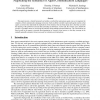Free Online Productivity Tools
i2Speak
i2Symbol
i2OCR
iTex2Img
iWeb2Print
iWeb2Shot
i2Type
iPdf2Split
iPdf2Merge
i2Bopomofo
i2Arabic
i2Style
i2Image
i2PDF
iLatex2Rtf
Sci2ools
119
click to vote
CI
2002
2002
Negotiating the Semantics of Agent Communication Languages
This paper presents a formal framework and outlines a method that autonomous agents can use to negotiate the semantics of their communication language at run-time. Such an ability is needed in open multi-agent systems so that agents can ensure they understand the implications of the utterances that are being made and so that they can tailor the meaning of the primitives to best fit their prevailing circumstances. To this end, the semantic space framework provides a systematic means of classifying the primitives along multiple relevant dimensions. This classification can then be used by the agents to structure their negotiation (or semantic fixing) process so that they converge to the mutually agreeable semantics that are necessary for coherent social interactions.
Related Content
| Added | 17 Dec 2010 |
| Updated | 17 Dec 2010 |
| Type | Journal |
| Year | 2002 |
| Where | CI |
| Authors | Chris Reed, Timothy J. Norman, Nicholas R. Jennings |
Comments (0)

